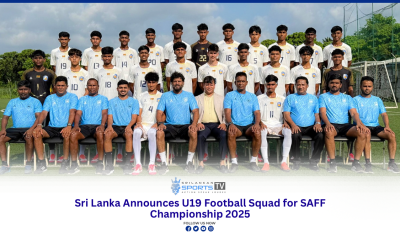News
Revisiting the 2019 World Cup and the league format
The ICC Men’s Cricket World Cup 2023 will follow the same format as the previous edition four years ago, meaning that all 10 teams will face one another.
With a new format set to be introduced in 2027, this will be the final go-around for the 10-team Group Stage which provides 45 entertaining encounters to decide on four semi-finalists.
In 2019, that began with a thrilling clash between England and South Africa at The Oval – the home side getting off to a winning start on their way to a maiden ICC Men’s Cricket World Cup victory.
With every team playing nine matches, the Group Stage lasted six weeks, with ebbs and flows as new contenders emerged.
The beauty of the format meant that a slow start was not necessarily fatal to a team’s chances of progressing.
In 2019, for example, Pakistan started very slowly, winning just one of their opening five matches – earning a 14-run success over eventual champions England at Trent Bridge.
Despite that, Pakistan finished with four successive victories to get to within a whisker of qualification, missing out on the semi-finals on net run-rate.
They finished level on points with runners-up New Zealand and just one point behind England as momentum almost carried them into the semi-finals as the form side.
At the other end of the spectrum, Australia were the first team to clinch a place in the last four, winning six of their first seven matches, the only exception a defeat to India.
India were the next team to book their semi-final spot, beating Bangladesh on their way to leading the Group Stage with seven wins from nine matches.
However, the World Cup is as much about timing your run as being fast starters, and it was the hosts and the Kiwis who found their best form come semi-final time.
With every team having had their chance to take on the world’s best, the knock-out stages were all about peaking on the day.
First up were India and New Zealand, who faced off over two days at Old Trafford as the weather played its part in proceedings.
It went down to the wire, but some stunning fielding from Martin Guptill to remove MS Dhoni in the penultimate over helped the Black Caps to an 18-run victory.
The following day, England were rather more emphatic in avenging their Group Stage loss to Australia, powering to an eight-wicket win to earn a place in the final for the first time since 1992.
Those results meant that the final would crown a new champion for the first time in more than two decades since Sri Lanka had claimed victory as one of the hosts in 1996.
England went onto emulate the Sri Lankans, famously doing so in the most dramatic circumstances at Lord’s.
New Zealand made 241 for eight batting first, before England matched that total, bowled out for 241 in reply to set up a Super Over.
Again, the teams matched each other blow for blow in the Super Over, each scoring 15 runs, as England were crowned champions on boundaries scored.
Victors in the first game, champions in the last, England showed just how to manage this Cricket World Cup format on their way to lifting the trophy.
The question now is, will they be able to repeat the feat or will someone else prove to be the masters of the 10-team Group Stage set-up?
Cricket
“It’s Not in My Hand” – Shanaka Leaves Captaincy Decision to Selectors After World Cup Exit
Sri Lanka captain Dasun Shanaka has admitted that his future as T20 skipper is no longer in his control following the team’s early exit from the ICC Men’s T20 World Cup, stating that the decision now rests entirely with selectors and Sri Lanka Cricket.
“I don’t know how long I will be as captain. It’s not in my hand; it’s up to the selectors and Sri Lanka Cricket. I’m happy to lead this team. I have taken some good decisions; in the meantime, some didn’t go as planned,” Shanaka said after Sri Lanka’s 61-run defeat to New Zealand.
His remarks came at the end of a turbulent campaign that began with promise but ended in disappointment.
Tactical Misread Proves Costly
Shanaka openly acknowledged that misjudging conditions played a key role in the heavy loss to New Zealand at the R. Premadasa Stadium.
Sri Lanka elected to bowl first, expecting the fresh surface to behave similarly to earlier matches.
“We thought the pitch would be a good one because it was new. We didn’t expect it to turn that much. It was a collective decision to bowl first. Unfortunately, it didn’t go the way we thought. It became another typical Kettarama wicket where the ball spun.”
New Zealand recovered from 84 for 6 thanks to a late assault, adding 70 runs in the final four overs to reach 168 for 7 — a surge Shanaka admitted proved decisive.
“They bided their time and then exploded. Conceding 70 runs in four overs was disheartening. If we had kept them around 130, we might have had a chance.”
Batting Collapse Seals Fate
Sri Lanka’s reply faltered immediately. Pathum Nissanka fell first ball, and regular wickets derailed the chase. Only Kamindu Mendis (31) and Dunith Wellalage (29) showed resistance, but the target was never seriously threatened.
Shanaka did not hide his frustration.
“We have some of the best batters in the country. Everyone walks out intending to win for Sri Lanka. It’s very disappointing that we couldn’t deliver anything for our fans.”
He also reflected on the narrow defeat to England earlier in the Super 8 stage — a result that, in his view, could have changed the team’s tournament trajectory.
A Campaign of Highs and Lows
Sri Lanka’s World Cup journey started brightly with wins over Ireland, Oman and Australia. However, a shock loss to Zimbabwe in the final group game shifted momentum dramatically.
Subsequent defeats to England and New Zealand ended hopes of a semi-final berth.
With one match remaining against Pakistan in Pallekele, Sri Lanka now play purely for pride.
“I have no words for the fans to say we haven’t given them anything to cheer for. But we will look forward to ending the tournament on a high,” Shanaka concluded.
What Next for Shanaka?
Shanaka’s comments suggest uncertainty over his leadership future. While he remains willing to continue, the final call lies with selectors and Sri Lanka Cricket — decisions likely to shape the next phase of Sri Lanka’s T20 rebuild.
As the curtain falls on a disappointing campaign, attention now turns to accountability, leadership direction, and whether change is on the horizon for Sri Lankan cricket
Cricket
Co-host Sri Lanka crash out after 61-run hammering by New Zealand in Colombo
Co-hosts Sri Lanka were knocked out of the ICC Men’s T20 World Cup after suffering a crushing 61-run defeat to New Zealand national cricket team in their Super Eights clash at R. Premadasa Stadium on Tuesday night.
Chasing 169 for victory, Sri Lanka faltered under pressure and limped to 107/8 in their 20 overs — a performance far below expectations for a side playing at home and carrying co-host status.
Powerplay Collapse Set the Tone
The chase never truly began. Sri Lanka crawled to just 20/2 in the Powerplay, a stark contrast to New Zealand’s 44/2 in the first six overs. The early damage left the middle order with too much to do, and the required rate kept climbing.
By the 14-over mark, the hosts were reeling at 71/6, effectively ending hopes of a comeback. The lack of intent against spin and disciplined seam bowling exposed Sri Lanka’s fragile batting unit on a surface that offered grip but was far from unplayable.
New Zealand’s Late Surge the Difference
Ironically, New Zealand themselves were under pressure at 88/6 in 14 overs. However, a crucial 50-run stand between Mitchell Santner and Cole McConchie in the death overs swung momentum decisively.
The Black Caps plundered 70 runs in the final phase, finishing on 168/7 — a total that proved more than enough against Sri Lanka’s timid response.
The boundary count told the full story:
- New Zealand: 8 sixes, 13 fours (100 runs in boundaries)
- Sri Lanka: 1 six, 8 fours (38 runs in boundaries)
In modern T20 cricket, such disparity is unforgiving.
Tactical Questions for the Hosts
Sri Lanka’s elimination is particularly disappointing given their familiarity with conditions and strong home support. The batting approach appeared overly cautious, and the inability to rotate strike compounded the pressure.
Their 46% dot-ball percentage further underlined the stagnation in the chase — a worrying sign at this level.

As co-hosts, expectations were high for a deep run. Instead, Sri Lanka exit the tournament with serious questions over:
- Batting intent in high-pressure chases
- Middle-order stability
- Tactical flexibility in crunch moments
End of the Roa
With this defeat, Sri Lanka’s Super Eights campaign comes to a premature end, while New Zealand march on with confidence and momentum.
For Sri Lanka, the heartbreak is magnified by the fact that the dream has ended on home soil — under the Colombo lights, in front of their own fans.
A tournament that promised pride and progress now closes with reflection and regret.
Cricket
Sri Lanka vs New Zealand in T20 World Cup: Head-to-Head Record, Past Results & Winning Trends
As Sri Lanka prepare to face New Zealand in the ICC Men’s T20 World Cup, history shows a competitive rivalry — but one where the Black Caps hold a slight statistical edge.
Here’s a closer look at the Sri Lanka vs New Zealand head-to-head record, their T20 World Cup results, and recent winning momentum.
Overall T20 Head-to-Head Record
- Total Matches: 28
- New Zealand Wins: 16
- Sri Lanka Wins: 11
- No Result: 1
New Zealand have won 57% of the encounters, giving them the overall advantage. However, Sri Lanka have delivered key performances on the World Cup stage.
Sri Lanka vs New Zealand – T20 World Cup History
2007 – Sri Lanka’s Dominant Chase
Johannesburg
New Zealand: 164/7
Sri Lanka: 168/3 (18.5 overs)
Result: Sri Lanka won by 7 wickets
Sanath Jayasuriya’s 61 guided Sri Lanka to a comfortable chase. It remains one of Sri Lanka’s strongest T20 World Cup wins over New Zealand.
2010 – Last-Ball Drama
Providence
Sri Lanka: 135/6
New Zealand: 139/8 (19.5 overs)
Result: New Zealand won by 2 wickets
Sri Lanka defended hard, but New Zealand held their nerve to win with one ball remaining.
2012 – Thriller in Pallekele
Pallekele
New Zealand: 174/7
Sri Lanka: 174/6
Match tied – Sri Lanka won Super Over
One of the most dramatic T20 World Cup games between the two sides. Sri Lanka held their composure in the Super Over on home soil.
2022 – New Zealand’s Big Win
Sydney
New Zealand: 167/7
Sri Lanka: 102 all out
Result: New Zealand won by 65 runs
A heavy defeat for Sri Lanka, marked by a batting collapse while chasing 168.
Recent Form Comparison
New Zealand – Last 5 Matches
W, W, L, W, Abandoned
Strong consistency
Clinical in pressure situations
Sri Lanka – Last 5 Matches
W, W, W, L, L
Positive run earlier
Slight dip in recent matches
New Zealand appear slightly more consistent heading into recent contests, while Sri Lanka’s form has fluctuated.
Key Trends from Past Meetings
Sri Lanka Succeed When Chasing Well
Both their World Cup successes (2007 and 2012 Super Over) came when they handled pressure calmly.
New Zealand Dominate with Bowling Discipline
In 2010 and 2022, New Zealand’s structured bowling attacks made the difference.
Big Margins Favour New Zealand
Sri Lanka’s wins tend to be controlled or tight.
New Zealand’s wins often come through dominant bowling or strong finishing.
Winning Edge: Who Holds It
- New Zealand Advantage: Overall record, recent dominant World Cup win (2022), balanced bowling attack.
- Sri Lanka Advantage: Ability to thrive in pressure moments, strong spin resources, better familiarity with subcontinental conditions.
Final Analysis
New Zealand hold the statistical upper hand in T20 internationals and recent World Cup meetings. However, Sri Lanka have proven they can rise in high-pressure tournament moments — particularly when chasing or playing at home.
For Sri Lanka to shift the balance, they must:
- Avoid middle-order collapses
- Strike early in the Powerplay
- Control New Zealand’s middle overs
- Execute death bowling with precision
With history showing close contests and dramatic finishes, the Sri Lanka vs New Zealand rivalry remains one of the more balanced matchups in T20 World Cup cricket.
-

 Football1 year ago
Football1 year agoSri Lanka Schools National Championship 2025: Super 8 Fixtures and Grouping
-

 News1 year ago
News1 year ago2025 Schools Rugby Season Set to Thrill Fans with Knockout and League Action
-

 Cricket9 months ago
Cricket9 months agoNuwan Thushara Shines as RCB Storms into IPL 2025 Final
-

 Live4 years ago
Live4 years agoLive Broadcast of Syria vs Sri Lanka | AFC U23 Asian Championship Qualification
-

 Cricket1 year ago
Cricket1 year agoSri Lanka’s Greatest Cricketers: Top Batters and Bowlers of All Time
-

 News9 months ago
News9 months agoMajor Shake-Up in Sports Governance: New 2025 Regulations Reform National Sports Bodies in Sri Lanka
-

 Football1 year ago
Football1 year agoFFSL Rebrands Division-1 as ‘League-One’ with a Bold New Vision
-

 Football10 months ago
Football10 months agoSri Lanka Announces U19 Football Squad for SAFF Championship 2025






